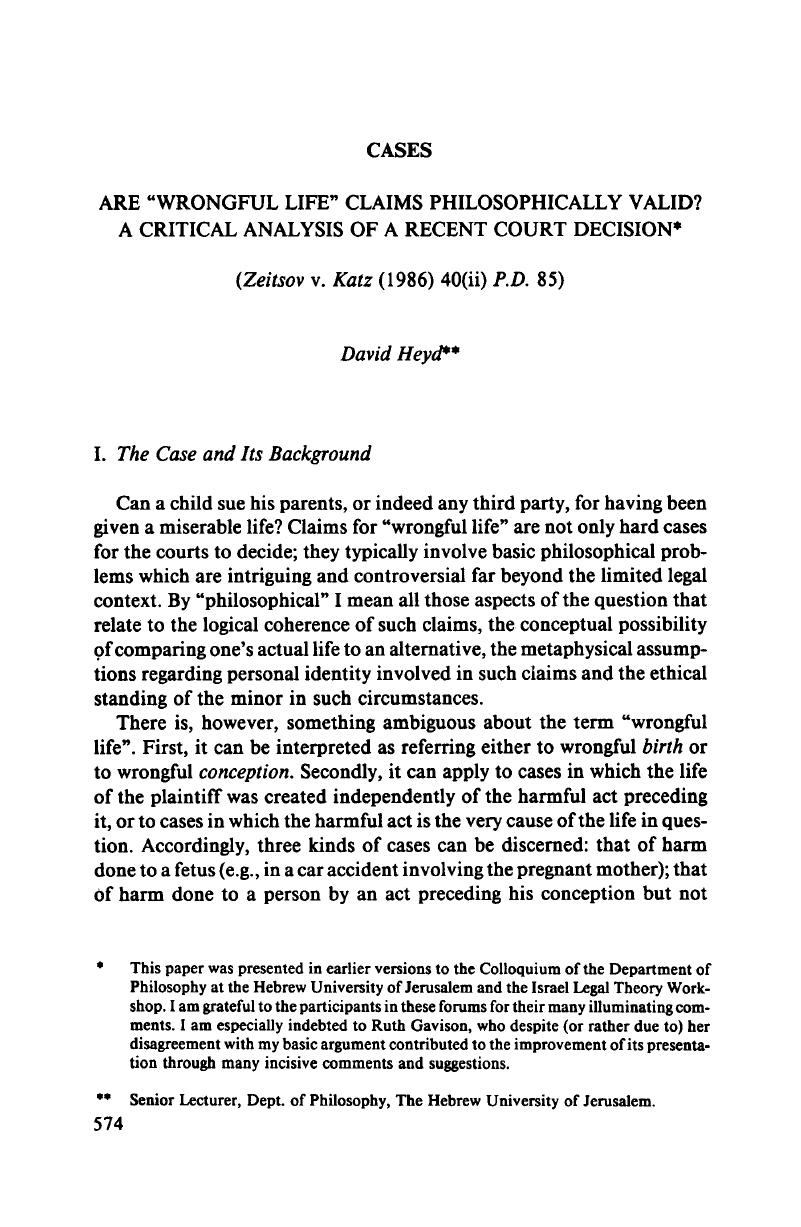Published online by Cambridge University Press: 16 February 2016

Senior Lecturer, Dept. of Philosophy, The Hebrew University of Jerusalem.
This paper was presented in earlier versions to the Colloquium of the Department of Philosophy at the Hebrew University of Jerusalem and the Israel Legal Theory Workshop. I am grateful to the participants in these forums for their many illuminating comments. I am especially indebted to Ruth Gavison, who despite (or rather due to) her disagreement with my basic argument contributed to the improvement of its presentation through many incisive comments and suggestions.
1 I would also claim, on the basis of an impersonal theory of value, that the parents (or doctors) have no moral duty to refrain from begetting a handicapped child except for that relating to the welfare of existing human beings. I would refer to it as a “generocentric” or “parento-centric” view. Here I limit my claim to the denial of legal or moral standing (right) on the child's part.
2 Tedeschi, G., “On Tort Liability for ‘Wrongful Life’” (1966) 1 Is.L.R. 513 Google Scholar. See especially secs. 6 & 7 and n. 42, which mentions a case exactly like the one discussed here.
3 I am grateful to Hanina Ben-Menahem for this important qualification.
4 The actual-potential distinction suggested here seems to be theoretically superior to the “foreseeability” criterion offered by Tedeschi, supra n. 2, at 522, which is epistemologically vague, and to the-distinction between “individual identification” and “the identification of a person as belonging to a particular group of people” (ibid., at 521), which raises logical problems as to how to determine the identity of the group.
5 Tedeschi, supra n. 2, at 514, quoting the Talmud in Sotah 12a.
6 Cf. the opinion of D. Levin J., pp. 123ff.
7 See Heyd, , “The Ethics of Suicide” in Psychiatric Ethic, Bloch, S. and Chodoff, P., eds. (Oxford University Press, 1981)Google Scholar.
8 Nagel, T., “Death” (1970) 4 NousGoogle ScholarPubMed.
9 Tedeschi interprets Job's declaration as expressing a negative balance between happiness and misery (supra n. 2, at 530). However, it seems that even if one could justify a judgment concerning the balance of happiness and misery in his life, it would only support a decision to commit suicide, and not a regret for having been born. The way of regret seems to be only an incoherent means of avoiding the difficulties (psychological or logical) involved in suicide.
10 This symmetry applies also on the level of the parents' obligation: they have no obligation (toward the child) not to bring a miserable child into the world, just as they do not have an obligation to bring into the world a happy one. I cannot elaborate on this controversial statement here, but the present argument does not rest on it.
11 All translations from the Hebrew of the Court's decision are my own.
12 Goldberg J.'s opinion (p. 128), quoting the American case of Speck v. Finegold, 408 A. 2d 496 (1979), at 508.
13 This view is most forcefully stated by Parfit, D., Reasons and Persons (Oxford University Press, 1984) ch. 17Google Scholar.
14 E.g., to richer parents, into a higher class, a more privileged race or sex; thus a “slippery slope” is created and the Court's decision may have adverse precedential implications, which may put pressure on Israeli courts in the future. But this is a pragmatic rather than theoretical issue.
15 Tedeschi, supra n. 2, at 529.
16 2 L.S.I. [N.V.] 5, sec. 2(2).
17 Supra n. 2, at 516-518.
18 Ben-Porat D.P. (p. 106), D. Levin J. (pp. 124-125), and Goldberg J. (p. 130) prefer leaving the matter to the legislature, while Barak J. (pp. 118ff.) insists on leaving it to the Court.
19 Cf. Goldberg J.'s opinion, pp. 127ff. Yet his argument for that view cannot be accepted as it is based on the idea that the “reasonable man” has no access “to the mysteries of life” and on the assumption that the denial of the right to inexistence is a matter of value choice which is not regulated by rational principles.
20 CMND 5709, 1974.
21 Fuller, L.L., Legal Fictions (Stanford University Press, 1967) 9 Google Scholar.